On December 22, 2017, in the context of the project "Viole in Sigmundsherberg [violets in Sigmundsherberg], an exhibition was held in Pesaro: Briciole e Nostalgia, il Natale di cento anni fa nel lager di Sigmundsherberg [Crumbs and nostalgia, the Christmas of a hundred years ago in the concentration camp of Sigmundsherberg].
With photographs and conferences, students from Pesaro's institute S. Marta-G. Branca acquired a sense of the experience during their visit on November 2, 2017 - to the Italian cemetery of the Great War in Austria's Sigmundsherberg camp.
In November 1917, my maternal grandfather, Cermaria Elmo, was taken to this camp. This is the video of the event: https://m.youtube.com/watch?feature=youtu.be&v=IHIfaCj85HE
It was the first time in a century that students from an Italian school visited this camp and its cemetery. Aurelio Slataper, nephew of Scipio Slataper, at the opening of the presentation in Trieste of the book about the story of my grandfather (Forte Verena, 24 maggio 1915 ore 4 - Trilogia della Grande Guerra [Fort Verena, May 24, 1915, 0400 hours - A trilogy of the Great War]): "The trilogy by Francesco Nicolini is a composite mosaic whose pieces give back with great immediacy and deep emotion the memory that the nephew has of his grandfather. It is the recollection of a peasant society which, marginalized by modernity, is nevertheless the very source from which Italian society has drawn the material and moral force for its progress. Moreover, Francis' trilogy brings us back, through the filter of memory, to reflect on the distance that runs between the official historiography and the reality of facts." [Trans.]
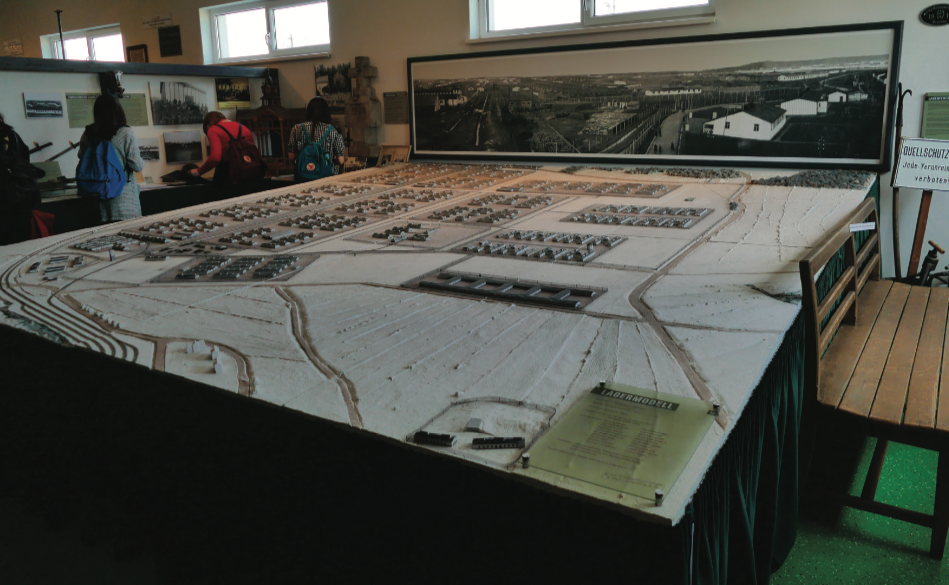
Aurelio Slataper concluded his speech by saying: "Social history is reversing the image of the Great War with a narration of the "war of the poor" very different from the "war of the Generals." This narration, to which belongs the memory of grandfather Peppe, constitutes the juxtaposition of the commemorative literature that the recent centenary has served us." [Trans.]
Some considerations: we have seen in recent years increased individualism and narcissism, the omnipotence of limitless desires as functional elements for our consumer society. On the one hand, the sense of a boundless freedom has spread, on the other hand, this has created disarray, imbalance, perverse effects (as sociologists say) that are often accompanied by a climate of anguish, a certain difficulty in being oneself and finding meaning in one's own existence. This often happens to those who do not recognize the importance of memory, condemning themselves to ignorance and to their denial. Through Memory we find the many parts and different influences that coexist within us and that give meaning and substance to our unique life. My grandfather's story helps me to recognize what matters in life: my grandfather told me of his war, of his fear of dying, teaching me not to be afraid of living. He told me: "do your duty and don't be scared of anything." With time his teachings have helped me to overcome my many weaknesses, the difficulties of life and its values. My grandfather's story brings meaning to my existence, influences my worldview becoming my myth. A unique and indelible story that becomes part of my life, of my "bios," of my biography. If we think about it, all of us as individuals, we continue to grow through relationships, the language and stories of others, the lives of others. And, in these contexts and with these "materials," we keep modulating our lives as best we can. We learn every day to go on living in this world to find our place in it. The lack of a past was recognized by numerous psychiatrists and psychotherapists as a characteristic problem of the Germans of the post-WWII generation. Sammy Speier, a psychoanalyst, wrote, "After Auschwitz (in Germany) there is no longer any narrative tradition, there are no parents and grandparents anymore who would let the children sit on their knees, telling them about their lives in former times. Children need fairy tales, but they also need parents telling about their lives, in order to be able to build up their own relationship towards the past."
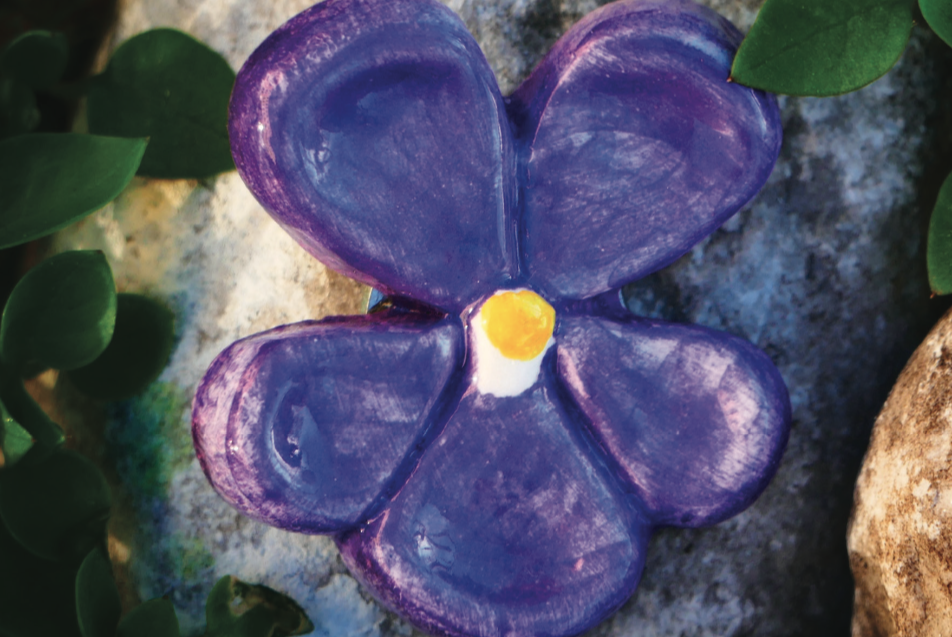
Having a conversation even from a distance with other generations - as I tried to do in this book - can help us in many ways. Everyone can find a meaning of their own. It helped me to reconsider the meaning of limits, which our fathers certainly understood more than us, the limit of respect for others, the rules for cohabitation, the bond and the value of the common good. It also helped me to find - through the story of those who experienced wars and miraculously survived - the simple value of life, of being part of the world, which does not need any other justification, and which is valid in itself. It is "the sheer pleasure of existing" where prevails the simple fact of being someone, where what is not necessary is overshadowed. Excessive consumerism, superfluousness, performance, competition making us all dependent, warping the meaning of our freedom by transforming it into a desire to HAVE rather than to BE, in a desire for POSSESSION which is, in its nature, so similar to the dark reasons of WAR.
Aristotle wrote that "Memory is the scribe of the soul." The book Forte Verena, 24 maggio 1915 ore 4 - Trilogia della Grande Guerra [Fort Verena, May 24, 1915, 0400 hours - A trilogy of the Great War] is born from old calendar sheets with my grandfather Pepe's notes. "Let people know what we have done for Italy…", he told me, offering me his manuscript on the day of my wedding in 1978 in Modena. His are the memories of his Great War, his soul, which my grandfather gave me. Inside this soul are the memories of a boy's childhood, Checco (as they called me when I was a child), memories lit up by the faint flame of an oil lamp, which I still have. They run through hell, the three years of war told by my grandfather, in his twenties.

Checco running alone, all grown up in Europe, walking in the footsteps of his grandfather and stopping in Austria. Astounded, dumbfounded, with a lump in his throat, he kneels on the lawn of an Italian war cemetery in an unknown camp of the Austro-Hungarian empire to say a prayer for the grandfather's friends who did not make it home, who remained there forgotten by everyone, naked in their mass graves, covered in the spring by a mantle of thousands of violets: humble, hidden, like those young men. It is the Sigmundsherberg camp in Austria that will precede the other two camps where my grandfather was sent to forced labour: Josikafalvain Transilvania, Vinkovci, in Croatia. A hundred years ago, after being numbered and labelled, my grandfather spent Christmas in the concentration camp of Sigmundsherberg, stripped of his clothes and wearing paper, a prisoner distressed by a dark and painful nostalgia for his mother, thinking of what she would have lovingly prepared for him, while he shared in four parts among his three friends a loaf of black bread "cracking under the teeth," even weighing crumbs on a small wooden scale, sleeping on the ground, without straw, clutching his companions so as not to die from the cold. Worse than a beast! Italy does not know anything of the social history of the poor Italian people who had neither borders nor nations nor ideologies, but who were only men.
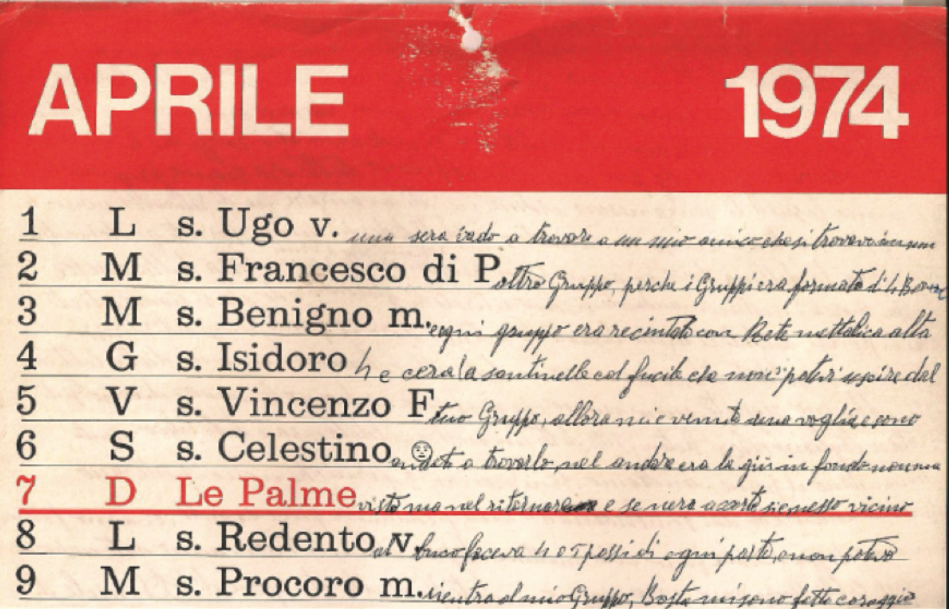
One of these men, with the uniform of the "enemy" but who spoke Italian, helped on his feet my grandfather, a prisoner, thrown to the ground, crying from despair and hunger, and gave him a piece of bread to somewhat appease his hunger: more than brothers with different uniforms, uniforms that they would never have wanted to wear, guns or bayonets that they would never have wanted to put their hands on. On November 2, 2017, in Austria, in the cemetery of the camp, we offered the citizens of Sigmundsherberg, who were eager to see the arrival "of the Italian young people," ceramic violets, like the one that I am wearing on my heart, explaining to them that they are to us the symbol of every fallen and forgotten Italian soldier. With tears in their eyes, the citizens of Sigmundsherberg moved us deeply while standing up in front of our flag together with their Mayor shouting, "Viva Italia"! We all cried together! Italians and Austrians had never done this before! Last Christmas 2017, I sent my best wishes to the Mayor of Sigmundsherberg, Franz Goed, who, as a sign of respect for our country, replied in Italian: "My dear friend Francesco! Thank you for your moving words. Last weekend I attended many pre-Christmas celebrations, meeting people of all ages, and I read them your letter. One hundred years later, we live in friendship and peace in a united Europe. For this we must be grateful, but we must not forget. Every time I pass in front of the camp cemetery, I think of your grandfather and pray for him, and I think of our funeral ceremony. Bring this message to Italy "To the many descendants of those fathers, grandfathers and great-grandfathers, I promise that here in Austria we will honour them with dignity and pay tribute to their memory" I wish you a Merry Christmas and a happy new year 2018. Viva Italia. Your friend Francesco (I am honoured that we share the same name) and the Sigmundsherberg family."
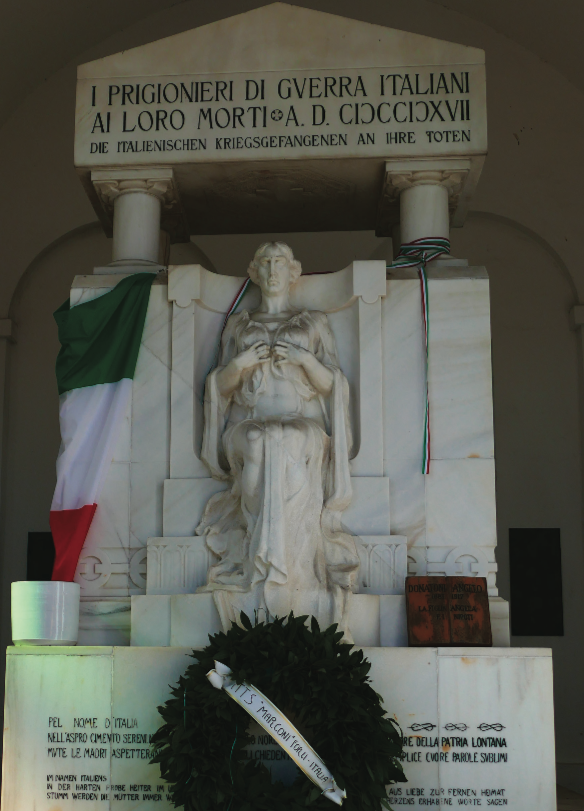
After having distributed "my grandfather's book" in some universities, on April 12, 2018, during the visit of the students of the ITTS G. Marconi of Forlì, Austria, through Mayor Franz Goed, dedicated the Italian war cemetery of the Sigmundsherberg camp to my grandfather with these words written in Italian, in German and in English: "In memory of all our grandfathers we dedicate this place to Mr. Cermaria Elmo infantryman in the First World War." I had to go to Austria to find what our grandfathers, for a century, have never had back from Italy: the honour and the dignity men had when they left for the war. Austria remembering prisoners in addition to their own soldiers seems to me a great sign of civility. Here we do not even remember our own dead.
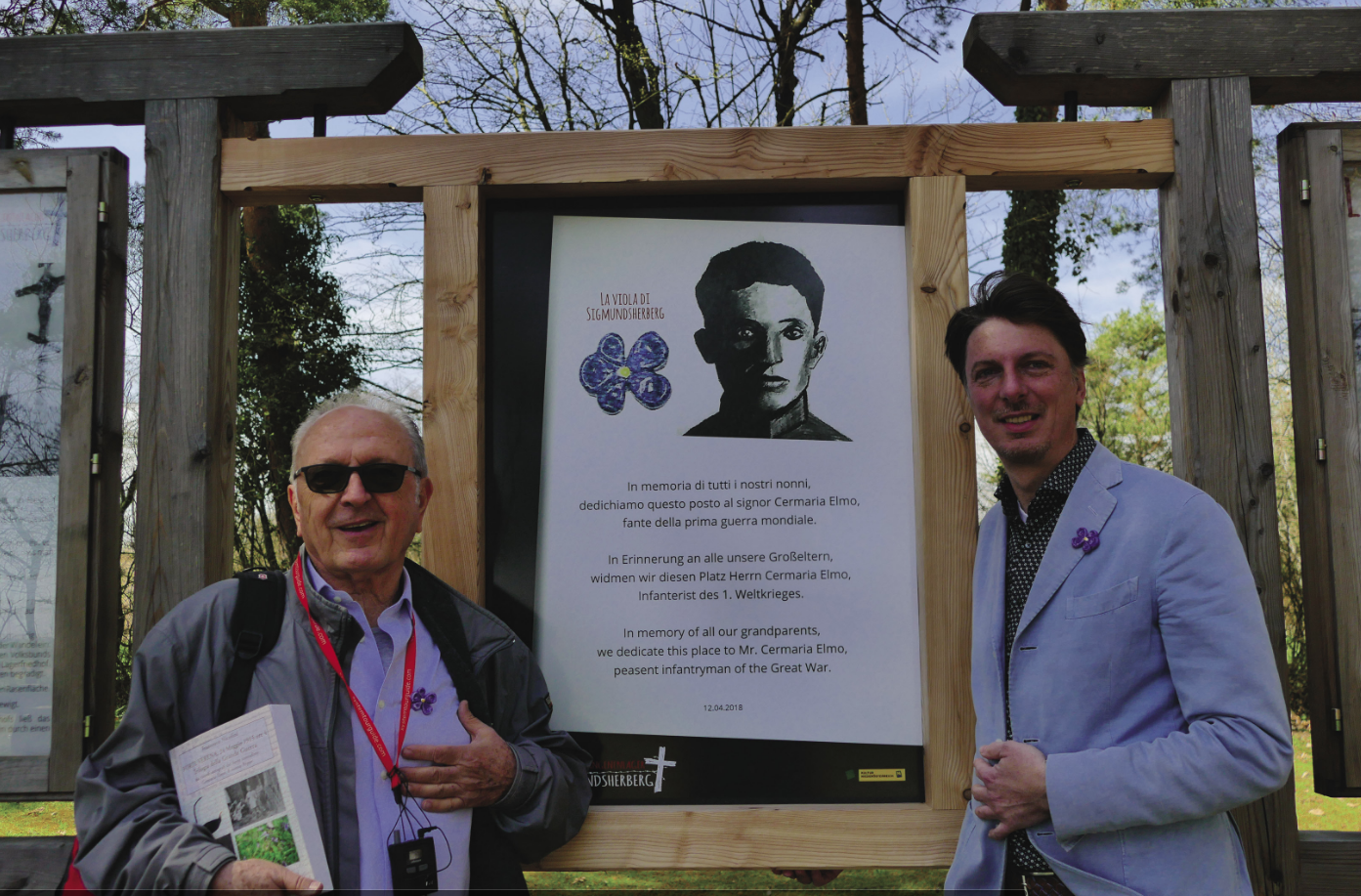 Let us ask ourselves what future may have a country which forgets and does not respect its dead! To make news today we need more than the "discovery" of an unknown Italian cemetery in an Austrian concentration camp. Here, after Caporetto, 300,000 Italian prisoners have passed, condemned by their generals and forgotten by an indifferent Italy that has lost its memory and its conscience! We know nothing about one hundred thousand of these boys as though they disappeared and never existed! Honouring with affectionate respect the life and memory of my grandfather, who ends his manuscript without any rancour, but only with an affirmation, "VIVA L'ITALIA," also helps me to redeem the suffering and death of all the grandfathers of that Italy, fostering greater awareness for the new generations. At the end of my speech during the Pesaro event, I gave these papers to Serena, a six-year-old girl who assisted with her family at the presentation. Serena promised me, crossing her little fingers and kissing them, as children do, that she will read these notes when she is older, when she is able to think for herself and understand, without conditions. I now have nothing left to do but what I promised my grandfather, "to continue raising awareness."
Let us ask ourselves what future may have a country which forgets and does not respect its dead! To make news today we need more than the "discovery" of an unknown Italian cemetery in an Austrian concentration camp. Here, after Caporetto, 300,000 Italian prisoners have passed, condemned by their generals and forgotten by an indifferent Italy that has lost its memory and its conscience! We know nothing about one hundred thousand of these boys as though they disappeared and never existed! Honouring with affectionate respect the life and memory of my grandfather, who ends his manuscript without any rancour, but only with an affirmation, "VIVA L'ITALIA," also helps me to redeem the suffering and death of all the grandfathers of that Italy, fostering greater awareness for the new generations. At the end of my speech during the Pesaro event, I gave these papers to Serena, a six-year-old girl who assisted with her family at the presentation. Serena promised me, crossing her little fingers and kissing them, as children do, that she will read these notes when she is older, when she is able to think for herself and understand, without conditions. I now have nothing left to do but what I promised my grandfather, "to continue raising awareness."
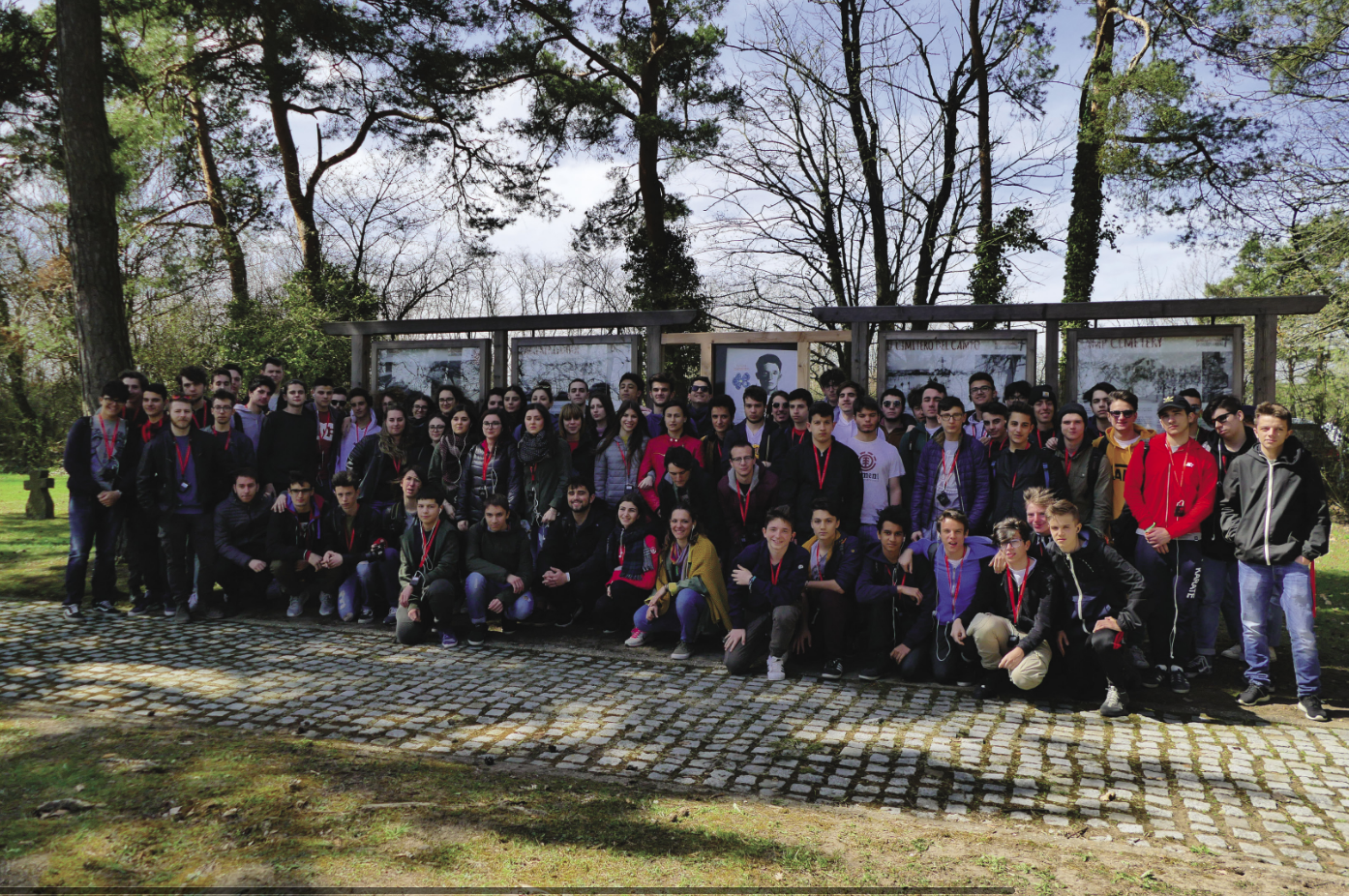

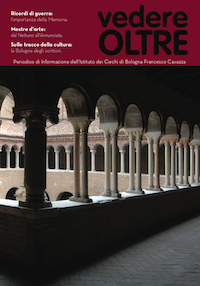



.png)